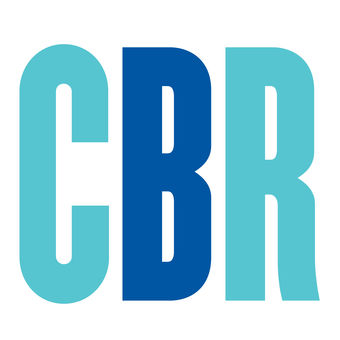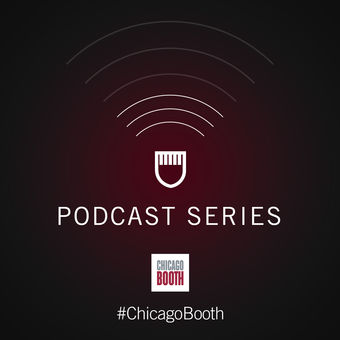
The Big Question Podcast
Chicago Booth Review
The Big Question is a monthly podcast from the Chicago Booth Review at The University of Chicago Booth School of Business. Every month, we ask Booth faculty and invited guests for their perspectives on important issues. We cover a broad range of themes, from the US economy to the fate of the euro, from political polarization to the future of retail, and all points in between. For intelligent, thought-provoking, in-depth discussion, join us every month for the Big Question.
- 28 minutes 22 secondsHow to fix a toxic working culture
Most US companies have a toxic culture, according to Lucia Annunzio, Adjunct Associate Professor of Executive Education at Chicago Booth. The hallmarks are a lack of transparency, short-termism, and top-down leadership. As a result, employees feel micromanaged, stressed, and disengaged. So what can managers do to stop the toxicity and create a healthy work culture?
8 May 2024, 9:00 am - 20 minutes 1 secondCan India’s economy break the mold?
With a population of 1.4 billion, India is the world’s biggest democracy and already one of the world’s leading economies, but it still has huge potential to grow its economy. So how should India grow? And what does the country need to realize the potential of its human capital? In this episode, we speak to Chicago Booth’s Raghuram Rajan, who served as Governor of the Reserve Bank of India from 2013 to 2016, about his new book, Breaking the Mold: India’s Untraveled Path to Prosperity. This is the first of two podcasts with Rajan about the book.
7 May 2024, 4:26 pm - 25 minutes 16 secondsDo you really get more conservative as you age?
Political folk wisdom tells us that people become more conservative as they get older. But does the evidence back that up? And is the political divide between older and younger voters getting bigger? In this episode, we speak with Chicago Booth’s Sam Peltzman about his research on political ideology.
24 April 2024, 9:00 am - 28 minutes 25 secondsHow low productivity cost you $25,000
For the past 20 years, the growth in US productivity has been sluggish at about 1.2%, compared to the 3% pace at which it grew from the mid-1990s to the mid-2000s. Chicago Booth’s Chad Syverson says that if US productivity hadn’t slowed, the US economy would be bigger to the tune of $25,000 per person. So what’s happening to productivity, and is it finally about to turn the corner?
17 April 2024, 9:00 am - 21 minutes 17 secondsDoes tackling global warming require global reporting rules?
Climate change is a global problem, so it can’t be solved by a limited number of countries acting alone. But can we develop and enforce global rules? In this episode, we hear from Chicago Booth’s Christian Leuz, an accounting professor who advocates for companies to report their carbon emissions. This is our second podcast with Leuz about emissions reporting and climate change. We released the first in March under the title, “Could reporting carbon emissions help cut them?”
10 April 2024, 9:00 am - 24 minutes 37 secondsIs Elon Musk a modern-day Odysseus?
The ancient Greeks thought a lot about strategy, which is why strategists in business, politics, and the military still draw on their wisdom today. So what business lessons can we learn from the heroes of the Iliad and the Odyssey? In this episode, we hear from Chicago Booth’s Greg Bunch, who teaches new venture strategy to MBA students and executives. When he’s advising entrepreneurs, when does he urge them to be more like Agamemnon, who was able to bring people together for a common cause, or Odysseus, known for his strategic mind and his ability to outwit opponents, or Achilles, the most skilled of all warriors? And what characteristics do today’s business leaders share with the legendary leaders of ancient Greece?
3 April 2024, 9:00 am - 18 minutes 31 secondsCould reporting carbon emissions help cut them?
If you want to lose weight, you first need to know how much you weigh, how many calories you’re eating a day, and how many minutes of exercise you’re getting. Now imagine you post all that information on your social media page and ask your contacts to hold you accountable. Could that same idea help us tackle global warming? In this episode, Chicago Booth’s Christian Leuz says the same transparency that helps regulators and investors understand what businesses are doing financially could help combat the damage they do to the environment.
27 March 2024, 9:00 am - 20 minutes 18 secondsWhy are workers so disengaged?
Most workers in the US say they are feeling angry, anxious, and disengaged from their jobs. Why is that, and what can be done? In this episode, we hear from one of the world’s leading researchers on motivation, Chicago Booth’s Ayelet Fishbach, who calls this “a crisis of motivation” whose roots lie in how we work, and how we think about work. The motivation crisis has consequences for both employees and employers. So how can we get ourselves and our teams excited about work again?
20 March 2024, 9:00 am - 18 minutes 18 secondsWhat’s wrong with charity?
Some people say that you don’t help the poor by giving them money, but by giving them opportunities to earn money. This is behind the periodic campaigns to limit welfare benefits in order to encourage work. But is a handout necessarily different from a hand-up? In this episode of the Chicago Booth Review podcast, Chicago Booth’s John Paul Rollert reflects on how we think about helping the poor and charitable giving. https://www.chicagobooth.edu/review/whats-matter-handouts
13 March 2024, 9:00 am - 18 minutes 41 secondsWould you call out a microaggression?
Would you speak up at work if one colleague said something that unintentionally discriminated against another? And if you did, what would you actually say, and when and how would you say it? In this episode, we continue our Business Practice miniseries, where we ask people to script what they would say in a challenging workplace scenario. Chicago Booth behavioral science professor George Wu analyzes the results.
6 March 2024, 10:00 am - 26 minutes 28 secondsAn economist debunks “Gone with the Wind”
The movie “Gone with the Wind” depicts a genteel, harmonious world torn apart as the old way of life comes to an end. Behind that gentility was the inhumanity of slavery, whose end transformed the economy of the American South. Morally, that was a good thing, but, contrary to the depiction in the movie, was it also positive for the economy? In this episode, we talk to Chicago Booth’s Rick Hornbeck, whose research with Trevon Logan, a professor of economics at The Ohio State University, suggests that emancipation created huge economic value, a boost to the US economy that was even bigger than the introduction of the railroad.
28 February 2024, 10:00 am - More Episodes? Get the App
- http://review.chicagobooth.edu
- English
Your feedback is valuable to us. Should you encounter any bugs, glitches, lack of functionality or other problems, please email us on [email protected] or join Moon.FM Telegram Group where you can talk directly to the dev team who are happy to answer any queries.
 Knowledge Applied
Knowledge Applied
 The Insightful Leader
The Insightful Leader
 Chicago Booth Management Conference 2009
Chicago Booth Management Conference 2009
 Columbia Ideas at Work
Columbia Ideas at Work
 University of Chicago Booth School of Business Podcast Series
University of Chicago Booth School of Business Podcast Series